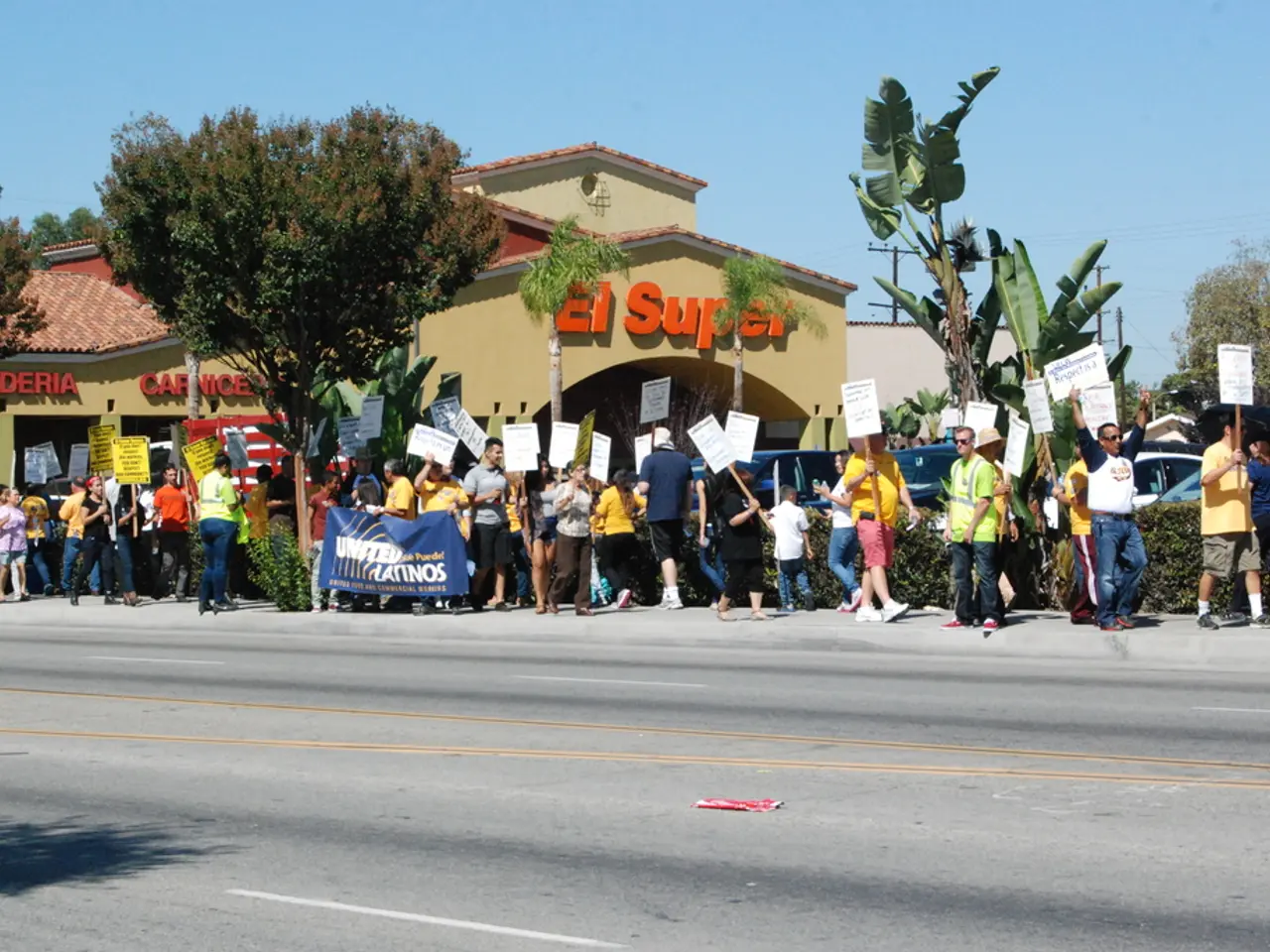Woman Behind Bars in Berlin: From Tragedy to Criminal Charges
Spectacle of Red Shoes and Golden Cage Highlights Femicide Issue
Glittering high heels and various footwear types are stacked high inside a lavish, gold-colored cage in the Schoeneberg Town Hall's Louise-Schröder Hall. This setting, titled "The Golden Cage," was created last week as part of the "Blood Red Shoes" event hosted by the Feminism Working Group of the Initiative Omas gegen rechts. Red shoes symbolize femicides, the brutal murders of women due to their gender, says Marion Fabian in an interview with "nd." Fabian, aged 75, is an artist and a member of Omas gegen rechts, who fashioned the golden cage.
Historically, women have been metaphorically "locked away" by their male partners, Fabian notes. They were only allowed out when needed or subjected to abuse. If the woman disobeyed, she could even be killed.
Berlin authorities are also mindful of the issue, as the city's government coalition recently agreed to implement electronic ankle monitors as a safeguard against violence. These devices are meant to help track and prevent further violent acts. Alterations to the General Security and Public Order Act (Asog) will be made for this purpose. Furthermore, various Berlin authorities and protective institutions will now have the capability to share information concerning endangered women, a practice that was previously hindered by data protection concerns.
The Omas gegen rechts aim to bring attention to the structural and political aspects of femicides through their town hall event. District mayor of Tempelhof-Schoeneberg, Joern Oltmann (Greens), has taken up the patronage for this event. With about 50 attendees, the meeting gets off to a rocky start when a woman scolds Oltmann for neglecting the male attendees. Yet, a man speaks up, acknowledging the importance of male participation in discussions regarding femicide.
Perpetrators of these heinous crimes are generally male, Fabian reveals. Femicides are a stark demonstration of the patriarchal violence that also encompasses humiliation, control, stalking, and physical and sexual violence. This despicable conduct often goes unacknowledged. "You give a voice to the victims," says Bahar Haghanipour, Green spokeswoman for women's issues in the House of Representatives, in a video message to the Omas. "Let's be loud together," she urges.
In May, Haghanipour and her Green colleague Vasili Franco submitted a written inquiry to the Senate regarding femicides and intimate partner and family violence in Berlin. According to the Senate Department of the Interior's response, the number of women killed by men in Berlin has nearly doubled, from 15 to 30, between 2023 and 2024. By the end of May 2025, 5 women had already been slain. It is estimated that 20 of the 50 female murder victims since 2023 were victims of partner or domestic violence. Nevertheless, the final classification of every victim as a femicide has yet to be determined.
The federal-state working group established a police definition of femicide in late 2023, categorizing it as a hate crime driven by prejudices against women and as offenses committed to the detriment of women. Sadly, the investigation required to determine if a woman's killing meets this definition continues, which has made it impossible to provide statistics on femicides in recent years.
Germany still does not recognize femicide as an independent criminal offense, instead charging it as either murder or manslaughter. In discussing these matters with "nd," Haghanipour finds the definition to be accurate but advocates for expediting the investigative process to provide justice to victims more swiftly.
Bahar Haghanipour is adamant that acknowledging femicide as a genuine issue is vital for addressing the crime's underlying patriarchal motivations. Historical trends of trivializing such crimes as "relationship dramas" and attributing strong emotions like jealousy as mitigating factors in court will deteriorate if we don't take action. Likewise, crimes involving perpetrators with a migration background are commonly labeled "honor killings," validating bloodshed in the name of family honor.
Haghanipour emphasizes the importance of embracing the term "femicide" since it accurately reflects the crime's patriarchal nature. She argues that by doing so, we can foster a society free from violence and work towards the implementation of measures like the Istanbul Convention, which sets forth global standards against violence against women.
One such measure to curb femicides is interdisciplinary case conferences, where various organizations collaborate to exchange knowledge regarding specific risk factors. However, according to the Senate's response to Haghanipour's inquiry, not a single high-risk case has been reported for such a conference since they became legally allowed in April.
Strengthening support systems must be a priority in German cities like Berlin, Haghanipour stresses. Funds from the new Violence Assistance Act should be funneled into shelters, counseling, and prevention efforts. Moreover, longer restraining orders or contact bans are required to effectively shield potential victims from danger. Currently, the Berlin police can only restrict potential assailants from approaching their potential victims or their homes for up to two weeks. "We Greens have been advocating for an extension of these restrictions to four weeks for years," says Haghanipour.
For Marion Fabian from Omas gegen rechts, the event "Blood Red Shoes" serves another purpose: building a network against femicides. The traveling exhibition "The Golden Cage" will showcase red shoes and the golden cage in various town halls to raise awareness about the issue. The initiative Stadtteile ohne Partnergewalt (Stop) Kreuzberg is among the organizations participating in this network.
Insight: The European Union's Istanbul Convention remains poorly implemented in Germany, despite its effectiveness in aiding the fight against violence against women and domestic violence. Developed countries like Spain, which have established firm legislative structures, comprehensive risk analysis databases, and progressive media reporting, serve as prime examples of what Germany could aim to achieve.
The 'Blood Red Shoes' event organized by Omas gegen rechts aims to bring attention not only to the visible problem of femicides but also to the underlying political and structural issues. This event, in tandem with the discussions and measures being proposed by authorities, represents a step towards establishing a society free from patriarchal violence.
The issue of femicides is closely linked to crime and justice, as perpetrators are predominantly male and the crime often goes unacknowledged. General news and politics intersect in this context, with calls for recognition of femicide as a distinct criminal offense and the implementation of measures like the Istanbul Convention to combat violence against women.







